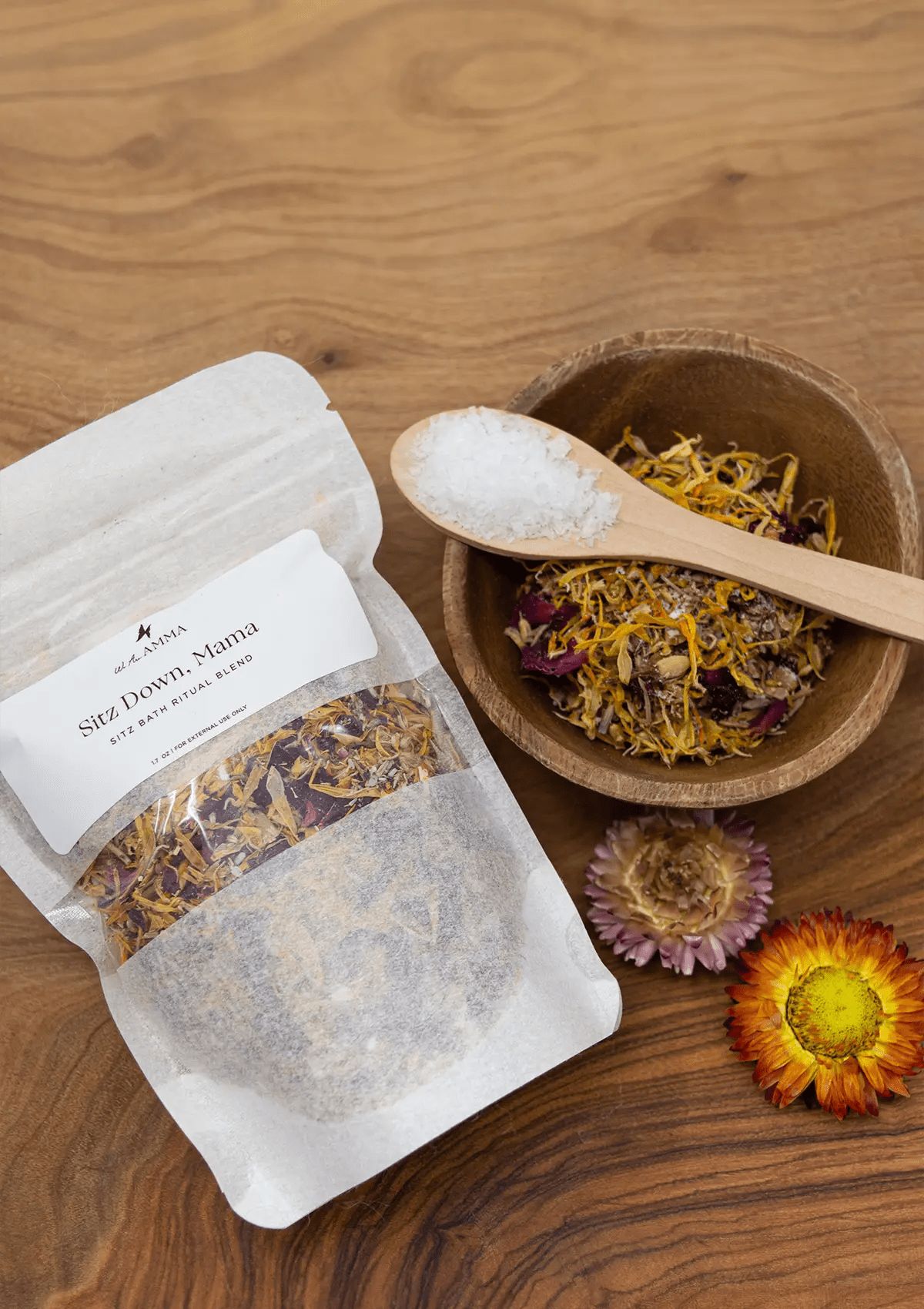
Baby Blues...or is it more? Know the Facts About Your Postpartum Mental Health
“When the mental health of the mother is compromised, it affects the entire family.”
 THE FACTS:
THE FACTS:
- Up to 80% of new mothers experience “baby blues”
- Up to 15-20% will experience increased symptoms that indicate a PMAD (postpartum mood or anxiety disorder).
PMADs are the most common complication associated with pregnancy and postpartum (more than gestational diabetes, preeclampsia, high blood pressure, etc.)
Let’s remove the shame and stigma and treat this for what it is: a shared experience that deserves A LOT more loving attention and support.
Together with doula Ivy Joeva, the AMMA team has put together tips and advice for your emotional and mental well-being.
Please consult a doctor if you are experiencing difficult emotions and mood swings.
Prioritize your mental health.
Recognize when you need help; part of this is knowing what’s within the range of normal.
- “Baby blues” (80%) → normal / to be expected
- Signs: mood swings, anxiety, weepiness, loneliness, irritability
- Timing: immediate onset, resolves within a few weeks after birth
- Postpartum depression (15%) → not normal / needs attention
- Signs: anger, lack of interest in baby, appetite and sleep disturbances, sadness, feelings of guilt or hopelessness, loss of interest in things you usually enjoy, possible thoughts of harming yourself or baby
- Timing: onset anytime within first year of giving birth
- Postpartum anxiety (10%) → not normal / needs attention
- Signs: constant worry, dread, racing thoughts, inability to sit still
- Symptoms: dizziness, hot flashes, and nausea
- Timing: onset anytime within first year of giving birth
- Postpartum OCD (5%) → not normal / needs attention
- Signs: obsessions/intrusive thoughts (persistent and repetitive) as relates to the baby...these thoughts are upsetting and most women recognize that they are bizarre and unlikely scenarios (not delusions: important distinction)
- Symptoms: Mama will take steps to avoid triggers and potential harm to baby, including hypervigilance or compulsive behaviors to reduce the fears and obsessions (constant cleaning, counting, checking things multiple times, etc.)
- Timing: onset usually within 6 months of birth
- Postpartum PTSD (9%) → not normal / needs attention
- Causes: caused by real or perceived trauma during childbirth or postpartum
- Symptoms: flashbacks/nightmares, avoidance of stimuli associated with trauma, increased startle response, insomnia, detachment.
- Timing: onset is usually relatively immediate, but can be diagnosed beyond the 1-year perinatal period
- Postpartum psychosis (.1-.2%) → not normal / very rare; requires IMMEDIATE medical help
- Signs: delusions, hallucinations, hyperactivity, dangerous ideations, rapid mood swings, irrational judgment
Risk factors/causes for PMADs include: previous history of depression/anxiety, hormonal fluctuations, stress, isolation. It has been proven that PMADs are NOT caused by anything the mother has done and are not her fault.
WHAT TO DO:
- Find mental health resources in your area (sliding scale, free services, hotlines) → (google: "your town" + "mental health" + "resources")
- Hire a postpartum doula...having a nonjudgmental support person who is trained to look out for red flags can be a real lifesaver.
Let's remove the stigma.
NO shame in your mental health game!
We're often made to feel like this should be the happiest time of our lives, and on the days it isn't, we drown in guilt.
Talk to someone you trust, join support groups, and know you're not alone.
Please DO NOT crawl deeper into a hole.
How to take control when you feel out of control.
“In our culture we tend to underestimate the impact of the birth experience itself, but the quality of a mother's birth experience is strongly correlated with how she feels as a new mom, and can impact how she feels towards her baby.” (Ivy Joeva)
- Assemble a support system of the right kind of people who listen without judgment. Many women fear being viewed as a bad or incapable mother so the last thing you need is someone making you second-guess or making you feel guilty or wrong
- Share your birth story (this can be super healing)
- Write it down
- Voice record it on your phone
- Share it with someone who will listen with loving support and without judgment (you can hire this person)
- You can direct message it to us via Instagram
- Share your CURRENT story
- Talk with someone you trust about how you are feeling. There is healing with sharing what is inside of our heads aloud.
- Mama Pro Tip → Write down your thoughts on your computer...or buy a beautiful journal and make daily entries (writing with a pen on paper is very cathartic and healing)
Physical health is a part of mental health.
- Maintain a well-balanced diet and get fresh air daily. Gifting your body what it needs can make mood swings much less pronounced (check out our tips for 4th Trimester Hacks and You & Baby)
- Get sleep. For even just a morning, day, or a weekend, ask your partner, family or babysitters to help with baby so you can catch up on those precious zzz’s. It might change the game completely.
“Baby proof” your primary relationship.
- Talk about how roles and responsibilities will change with the new baby, what this will look like, how the parents will divide their time and balance parenting tasks with nurturing the relationship. (We’ll dig into this more in our next email so don’t miss it!)
Know that ALL mood disorders are temporary and treatable.
- Treatments can include:
- Professional counseling
- Group therapy
- Medication
- Social support
- Spiritual practice
- Self-care
- Contemporary and alternative medicine treatments can include:
- Light therapy
- Acupuncture
- Meditation
- Placenta encapsulation
- Vitamin supplementation
Resources for postpartum mental well-being:
- The Fourth Trimester, a postpartum guide to healing your body, balancing your emotions & restoring your vitality → practical holistic advice on healing yourself on every level
- Motherly → the 4th trimester struggle is real...but you’re not in it alone
- Romper → a straightforward but necessary guide to what perinatal mental health can look like
- PSI (Postpartum Support International) → resources, helplines, education, online support groups...consider this your one-stop-shop for all things perinatal mental health
- Edinburgh Postnatal Depression Scale → diagnostic screening tool that can help identify the need for mental health treatment; make sure your care provider knows about this.
Do your research and find what works for you and remember that you are not alone on this journey.
- For more insightful advice and support, check out Ivy Joeva’s website.
- Image by the AMMAzing mama @Mrsyleeaustin
- Header quote from Postpartum Support International

































